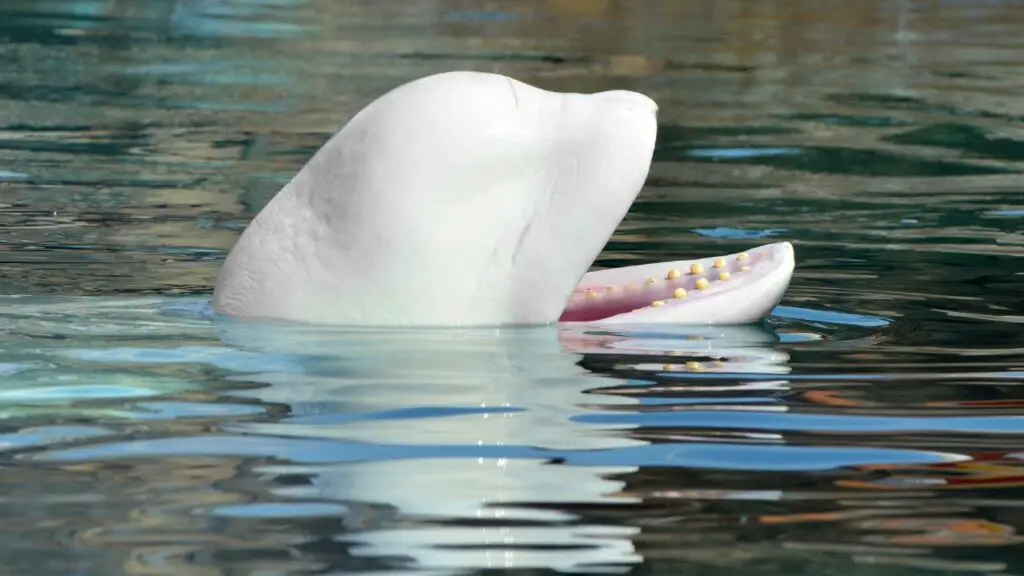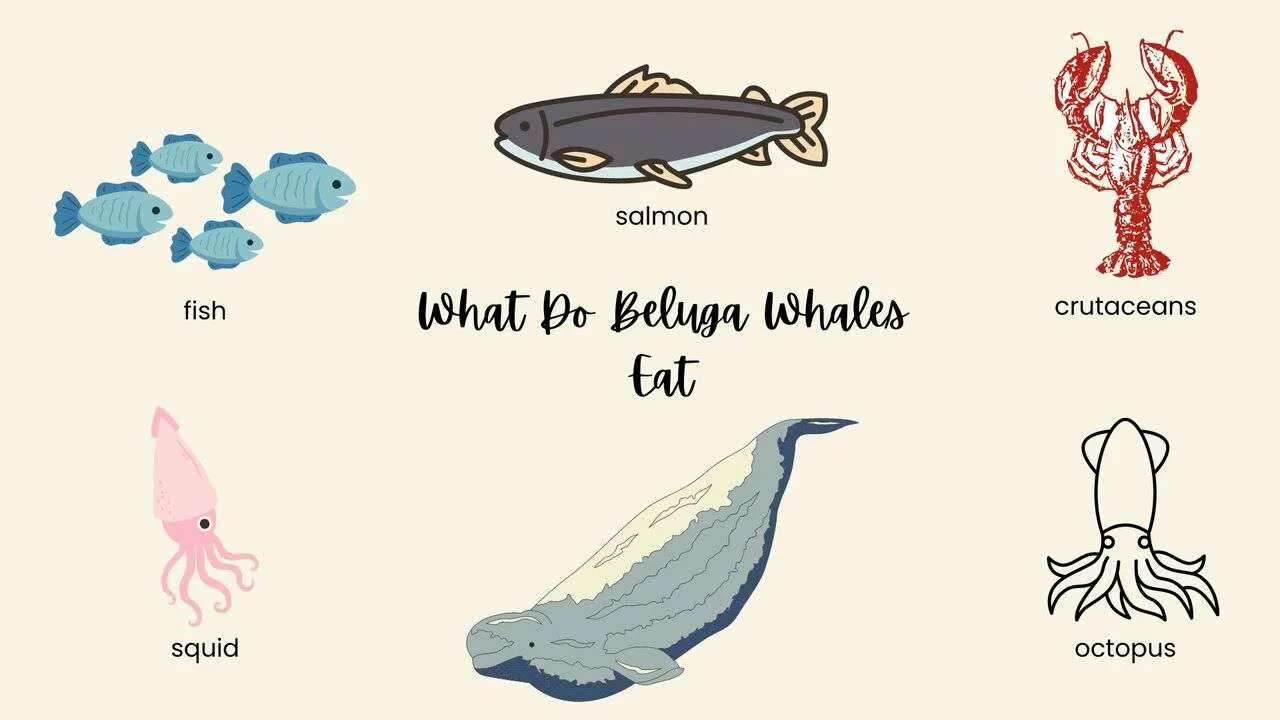Beluga whales are among the most captivating marine creatures in the world, and their unique behaviors continue to intrigue scientists and marine enthusiasts alike. One of the most noticeable behaviors of beluga whales is their tendency to open their mouths frequently. While some might think this is just a random act, there's a lot more to it than meets the eye. This article delves deep into the reasons why beluga whales open their mouths, shedding light on their communication, feeding habits, and social interactions.
Beluga whales, also known as "white whales," are highly social and intelligent animals. Their mouth-opening behavior plays a significant role in their day-to-day life, from hunting for food to engaging with other members of their pod. Understanding this behavior is crucial to gaining insight into the complex lives of these majestic creatures.
In this comprehensive guide, we will explore the science behind why beluga whales open their mouths, the purpose of this behavior, and its importance in their survival. Whether you're a marine biology enthusiast or simply curious about the underwater world, this article will provide you with all the answers you're looking for.
Read also:Unraveling The Tragic Tale Of Princess Killed A Deep Dive Into The Mystery
Table of Contents
- Beluga Whale Basics
- Communication Through Mouth Opening
- Feeding Habits and Mouth Use
- Social Interactions and Mouth Behavior
- Biological Aspects of Mouth Movement
- Environmental Impact on Mouth Behavior
- Research Findings and Studies
- Conservation Efforts and Mouth Health
- Frequently Asked Questions
- Conclusion
Beluga Whale Basics
Beluga whales (Delphinapterus leucas) are medium-sized marine mammals primarily found in the Arctic and sub-Arctic regions. Known for their striking white color and flexible necks, these whales have fascinated researchers for decades. Their ability to open their mouths frequently is not just a physical trait but a behavioral adaptation that serves multiple purposes.
Physical Characteristics
Beluga whales possess a unique set of physical features that make them stand out. They lack a dorsal fin, which helps them navigate icy waters, and their flexible necks allow for a wide range of motion. The ability to open their mouths wide is closely tied to their feeding and social behaviors.
Habitat and Distribution
Beluga whales inhabit the cold waters of the Arctic Ocean, as well as rivers and estuaries during the summer months. Their migratory patterns are influenced by the availability of food and the changing ice conditions. Understanding their habitat is essential to comprehending their mouth-opening behavior.
Communication Through Mouth Opening
Beluga whales are highly vocal creatures, using a variety of sounds to communicate with each other. One of the ways they express themselves is through mouth movements. These movements can convey different messages, from warnings to expressions of joy.
Types of Sounds
- Clicks: Used for echolocation to locate prey.
- Whistles: Employed for communication over long distances.
- Pulses: Indicate aggression or excitement.
Role of Mouth Movements
Mouth movements often accompany vocalizations, enhancing the message being conveyed. For example, a wide-open mouth may signal excitement or curiosity, while a closed mouth might indicate calmness or contentment.
Feeding Habits and Mouth Use
Beluga whales are opportunistic feeders, consuming a variety of fish, crustaceans, and squid. Their ability to open their mouths wide is crucial for capturing prey, especially in environments where food sources are scattered.
Read also:Elise Jordan Wikipedia Comprehensive Biography And Career Insights
Hunting Techniques
Beluga whales use their mouths to create suction, drawing in prey with remarkable efficiency. This technique is particularly useful in murky waters where visibility is low. Additionally, their flexible necks allow them to maneuver their heads to catch elusive prey.
Adaptation to Environment
Living in icy waters, belugas have adapted their feeding strategies to ensure survival. Their mouth movements are finely tuned to the specific challenges of their habitat, making them highly effective hunters.
Social Interactions and Mouth Behavior
Beluga whales are highly social animals, often forming tight-knit pods. Their mouth-opening behavior plays a significant role in their social interactions, helping them establish bonds and resolve conflicts.
Pod Dynamics
Within a pod, belugas use mouth movements to communicate with one another. These movements can indicate dominance, submission, or playfulness, contributing to the overall harmony of the group.
Conflict Resolution
In situations where conflicts arise, belugas use mouth movements to assert dominance or signal submission. This non-verbal communication helps prevent physical altercations, preserving the peace within the pod.
Biological Aspects of Mouth Movement
From a biological standpoint, the ability of beluga whales to open their mouths wide is rooted in their evolutionary history. This trait has been honed over millions of years, allowing them to thrive in challenging environments.
Evolutionary Adaptations
Beluga whales share a common ancestor with other cetaceans, and their mouth structure has evolved to suit their specific needs. The flexibility of their jaw muscles and the presence of specialized teeth enable them to exploit a wide range of food sources.
Health Indicators
The condition of a beluga whale's mouth can serve as an indicator of its overall health. Factors such as tooth wear, gum condition, and mouth infections can provide valuable insights into the well-being of these creatures.
Environmental Impact on Mouth Behavior
Environmental changes, such as climate change and pollution, can significantly affect the behavior of beluga whales, including their mouth movements. As their habitats undergo transformation, these whales must adapt to ensure their survival.
Climate Change
Rising temperatures and melting ice are altering the feeding patterns of beluga whales. These changes may influence the frequency and intensity of their mouth-opening behavior as they search for food in new locations.
Pollution
Contaminants in the water can have detrimental effects on the health of beluga whales, impacting their ability to feed and communicate effectively. Reducing pollution is crucial to preserving the natural behaviors of these magnificent creatures.
Research Findings and Studies
Scientific research has provided valuable insights into why beluga whales open their mouths. Studies conducted by marine biologists and conservationists have shed light on the complexities of this behavior, highlighting its importance in the lives of these whales.
Key Discoveries
- Beluga whales use mouth movements for echolocation, communication, and feeding.
- Environmental factors can influence the frequency and purpose of mouth-opening behavior.
- Conservation efforts are critical to protecting the habitats of beluga whales.
Future Research
Further studies are needed to fully understand the intricacies of beluga whale behavior. Advances in technology, such as underwater drones and acoustic sensors, are paving the way for more comprehensive research in this field.
Conservation Efforts and Mouth Health
Protecting beluga whales and their habitats is essential to preserving their unique behaviors, including mouth-opening. Conservation organizations and governments are working together to address the threats facing these whales and promote their well-being.
Protected Areas
Establishing marine protected areas is one of the most effective ways to safeguard beluga whale populations. These areas provide a safe haven for the whales to feed, communicate, and interact without human interference.
Public Awareness
Raising public awareness about the importance of beluga whales and their behaviors is crucial to conservation efforts. Educating people about the significance of mouth-opening behavior can inspire action to protect these incredible creatures.
Frequently Asked Questions
Why do beluga whales open their mouths so often?
Beluga whales open their mouths for various reasons, including communication, feeding, and social interaction. Their mouth movements are an integral part of their daily lives, enabling them to thrive in their environments.
How does climate change affect beluga whale behavior?
Climate change can alter the feeding and social behaviors of beluga whales, including their mouth-opening habits. As ice melts and water temperatures rise, these whales must adapt to new conditions to ensure their survival.
What can individuals do to help protect beluga whales?
Individuals can support conservation efforts by reducing their carbon footprint, supporting organizations dedicated to marine conservation, and spreading awareness about the importance of protecting beluga whales and their habitats.
Conclusion
The question of why beluga whales open their mouths has been explored in depth in this article. From communication and feeding to social interactions and biological adaptations, their mouth-opening behavior is a vital aspect of their existence. Understanding this behavior not only enriches our knowledge of these magnificent creatures but also highlights the need for conservation efforts to protect them.
We invite you to share this article with others who are passionate about marine life and to explore more content on our site. Together, we can make a difference in the lives of beluga whales and ensure their survival for generations to come.


